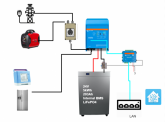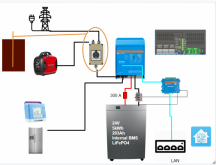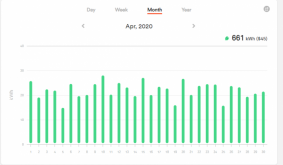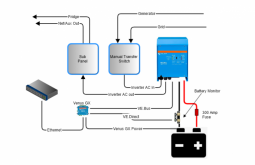oneandahalflegs
New Member
- Joined
- Jan 18, 2020
- Messages
- 38
Newbie here, but I am an engineer so.... ?
Anyway I have ALS and I require a vent , and therefore electricity, to breathe. I have been avoiding the emergency backup question for too long. Isaias was scary, 17 hours without power. I won't go into the BS I had my wife do to keep me alive. This event focused me. Solar with battery backup was the way to go..... then Covid killed the Aviation Industry and my employer laid off 45% of its work force. That included me.
Several months later one of my friends found out about my situation and started raising money for a temporary solution. The support was overwhelming.
So here I am planning a design that requires the least effort for my wife to handle. I jumped on the purchase of a battery, right or wrong, and bought the second generation 24V powerwall from bigbattery.com. 5kWh/203Ah. I also have a cheap small generator that I plan to use to recharge the battery and extend run time. I use Home Assistant to view, control and in some cases even automate things in the house. I want to do the same here so I need modbus. There is picture below that describes what I am trying to do.
So far I am looking at
Inverter charger: Victron Energy MultiPlus 24/3000/70-50 https://invertersrus.com/product/victron-energy-pmp243021102/
Inverter comm: Venus GX https://invertersrus.com/product/victron-venus-gx/
Battery monitor: ???
What else am I missing? comments, suggestions?
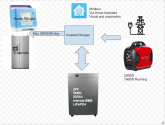
Anyway I have ALS and I require a vent , and therefore electricity, to breathe. I have been avoiding the emergency backup question for too long. Isaias was scary, 17 hours without power. I won't go into the BS I had my wife do to keep me alive. This event focused me. Solar with battery backup was the way to go..... then Covid killed the Aviation Industry and my employer laid off 45% of its work force. That included me.
Several months later one of my friends found out about my situation and started raising money for a temporary solution. The support was overwhelming.
So here I am planning a design that requires the least effort for my wife to handle. I jumped on the purchase of a battery, right or wrong, and bought the second generation 24V powerwall from bigbattery.com. 5kWh/203Ah. I also have a cheap small generator that I plan to use to recharge the battery and extend run time. I use Home Assistant to view, control and in some cases even automate things in the house. I want to do the same here so I need modbus. There is picture below that describes what I am trying to do.
So far I am looking at
Inverter charger: Victron Energy MultiPlus 24/3000/70-50 https://invertersrus.com/product/victron-energy-pmp243021102/
Inverter comm: Venus GX https://invertersrus.com/product/victron-venus-gx/
Battery monitor: ???
What else am I missing? comments, suggestions?




